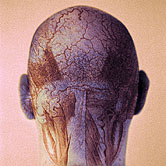Antidepressants May Prevent Depression After Stroke
Problem-solving therapy could also make a difference, study shows.
By Steven Reinberg
HealthDay Reporter
|
E-mail this article
Subscribe to news
Printer friendly version
|

(SOURCES: Larry B. Goldstein, M.D., professor, neurology, and director, Duke Center for Cerebrovascular Disease, Duke University Medical Center, Durham, N.C.; Argye Hillis, M.D., associate professor, neurology, Johns Hopkins University, Baltimore; Eric Smith, M.D., M.P.H., assistant professor, neurology, and associate director, Acute Stroke Services, Massachusetts General Hospital and Harvard Medical School, Boston; May 28, 2008, Journal of the American Medical Association)
TUESDAY, May 27 (HealthDay News) -- Stroke victims often succumb to depression in the months following their attack, but taking an antidepressant may reduce that risk, a new study finds.
To a lesser degree, problem-solving therapy also lowers the chances of depression among stroke victims.
More than half of the 700,000 people who will have a stroke in the United States this year will develop depression. Depression after stroke is associated with difficulty in recovering the activities of daily life and with an increased risk of death, University of Iowa researchers said in their report.
"The study highlights post-stroke depression, an important clinical problem," said Dr. Larry B. Goldstein, director of the Duke Center for Cerebrovascular Disease at Duke University Medical Center.
"A previous systematic review found that there was insufficient evidence from randomized trials to support the routine use of antidepressants for the prevention of depression or to improve recovery and pointed out the need for further study," Goldstein said. "This small trial provides evidence that pharmacological treatment might decrease the occurrence of post-stroke depression, and that there may be a role for behavioral intervention as well."
The report is published in the May 28 issue of the Journal of the American Medical Association.
In the study, Dr. Robert G. Robinson and his colleagues looked at the effectiveness of the antidepressant Lexapro or problem-solving therapy in preventing depression among people recovering from strokes.
Within three months of a stroke, 176 patients were randomly assigned to receive Lexapro (escitalopram), problem-solving therapy or a placebo. Problem-solving consisted of six sessions, plus an additional six reinforcement sessions, where patients were asked to select a problem and follow steps to solve it.
During 12 months of therapy, Robinson's group found that patients who received a placebo were 4.5 times more likely to become depressed, compared with patients who received Lexapro, and 2.2 times more likely to become depressed than patients in the therapy program.
Further analysis showed that Lexapro was significantly better than a placebo in preventing depression, while problem-solving therapy was not significantly better.
"The clinical implications of our findings are that patients who are given escitalopram or problem-solving therapy following acute stroke may be spared depression, and perhaps its adverse consequences," the researchers concluded.
One expert thinks that treating depression before it begins may be a viable option for some patients after stroke.
"Depression is a huge problem after stroke," said Dr. Argye Hillis, an associate professor of neurology at Johns Hopkins University. "This is an important study that might convince people to either start patients on preventive therapy or at least monitor very closely for depression and then start them on therapy."
Hillis noted that whether prevention is better than acute treatment isn't clear. "Based on this study, giving patients the option of preventive therapy may be the best choice for some patients," she said.
"One thing that has not been evaluated, and might be even more effective, is the combination of problem-solving therapy and medication," Hillis added.
Another expert isn't sure the results of this trial mean that all patients need to be treated for depression before it develops.
"This is a small study, and I think we need to be cautious before changing practice based on this study alone," said Dr. Eric Smith, associate director of Acute Stroke Services at Massachusetts General Hospital and Harvard Medical School.
"We need more research on treatment of post-stroke depression," Smith said. "Whether it's better to try to prevent depression, rather than treating depression after it develops, is not certain at this point," he added.
In this study, the majority of untreated patients (78 percent) never developed depression, Smith noted. "I'm not sure that my patients would want to take a brain chemical-altering drug based on a less than 50 percent chance of developing depression," he said.
"For now, I think it's most important that patients be evaluated by physical, occupational and speech therapy, as needed," Smith said. "The appropriate therapies for that individual, taking into account both the patient's individual needs and the institutional resources, can then be initiated."
More information
For more information on stroke, visit the American Stroke Association. 
Copyright © 2008 ScoutNews, LLC. All rights reserved. 
HealthDayNews articles are derived from various sources and do not reflect federal policy. healthfinder.gov does not endorse opinions, products, or services that may appear in news stories. For more information on health topics in the news, visit the healthfinder.gov health library.